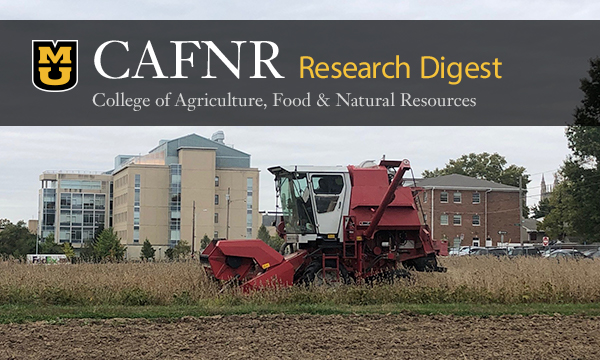|
Hua Qin Wins National Excellence Award as part of Research Team
Hua Qin, associate professor of environmental and resource sociology/demography in the University of Missouri College of Agriculture, Food and Natural Resources Division of Applied Social Sciences (DASS), is part of a multidisciplinary, multi-institution research team that was recently awarded the National Excellence in Multistate Research Award from the Association of Public and Land-Grant Universities and the United States Department of Agriculture (USDA). This prestigious and highly competitive award recognizes scientists who conduct exemplary research and outreach efforts across multiple states and in doing so enhance the visibility of USDA multistate programs. The team was awarded the Western Region Excellence in Research Award this summer.
Read more at: Hua Qin Wins National Excellence Award as part of Research Team
David Patterson Named American Society of Animal Science (ASAS) Fellow
For nearly 25 years, David Patterson has helped Missouri cattlemen get the most out of their beef cattle operations. Patterson piloted the Show-Me-Select Replacement Heifer Program early in his University of Missouri career. The program has now enrolled more than 150,000 heifers on more than 900 farms – and contributes more than $3.5 million annually to the Missouri economy.
“It is an honor to be named a Fellow of the American Society of Animal Science,” Patterson said. “The society has been an important part of my career, and it’s really exciting to receive this award.”
Read more at: David Patterson Named American Society of Animal Science (ASAS) Fellow
CAFNR faculty members have received the following recent grants (listed by Principal Investigator):
Kevin Bradley, Comparison of Non-Chemical Control Methods as Part of an Integrated Weed Management Strategy in Soybean: Comparison of Weed Electrocution to At-Harvest Weed Seed Destruction as Part of an Integrated Weed Management Strategy in Soybean, 10/1/20-9/30/22, $99,200, North Central Soybean Research Program
Pengyin Chen, Towards the development of high-yielding cultivars & germplasm with optimum oil and protein content and innovative oil attributes for the current market, 10/1/20-9/15/21, $66,816, Ohio State University
Felix Fritschi, AgResearch Task Order #5, 10/1/20-9/30/21, $120,057, AgResearch
James Heiser, Seed Materials Trial: Protocol PHY-Yield-20, 5/18/20-12/31/20, $16,900, Dow Agroscience LLC
Henry Nguyen, Genetic improvement of flooding tolerance and best management practices for sustainable soybean production, 1/1/21-12/31/21, $348,525, Smith Bucklin and Associates
Andrew Scaboo, An integrated approach to enhance durability of SCN resistance for long-term, strategic SCN management (Phase III), 10/1/20-9/30/21, $500,000, North Central Soybean Research Program
John Tanner, Investigating the Proline Cycle as a Potential Cancer Therapy Target, 9/15/20-8/31/21, $368,805, NIH National Institute of General Medical Sciences
Christopher Topp, Graduate Student Support/August Thies, 7/1/20-6/30/21, $45,245, Donald Danforth Plant Science Center
Ranjith Udawatta, Training/Workshops/Field Days for Missouri Landowners, Farmers, and Agency Personnel to Promote Public Awareness on Conservation Practices for Improved Water Quality, Soil Health, and Enhanced Ecosystem Services, 9/28/20-9/27/21, $38,311, Department of Agriculture
Provided by the MU Office of Research
|
